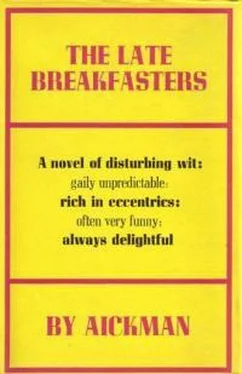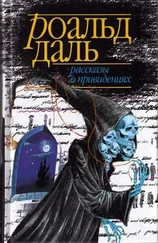‘Louise said that Hugo Raunds lived entirely for clothes.’
‘I can imagine what that means. Brittle women in models.’
‘Surely not in Montgomeryshire?’
‘Unlike us they travel wrapped in mink in centrally heated Rolls-Royces.’
‘Shall we not go?’
Lena thought for a moment. Then she said gently ‘You go, Griselda. They’d only eye me.’
‘I won’t go without you.’
‘It’s much the best thing. You could do with a holiday, and I could look after the shop. Stay a long time if you find you like it. As long as you want to. You’re beautiful and it’s a kind of thing you need. One kind of thing. Sometimes, anyway. So, please.’
‘You need a holiday too.’
‘Less than you.’
Griselda put her arm round Lena’s shoulders.
‘You’re good to me, Lena, I’m grateful.’
‘You gave me half a shop. I’ m grateful. I’ll look you up a train to Montgomeryshire.’
Of course Griselda had to change at Shrewsbury, but she had never expected to have to change at Welshpool as well.
Darkness had descended long before she arrived. The minute but not inelegant Welsh station seemed high among the mountains. A small but bitter wind crept murderously along the single platform. There was one oil lamp, and otherwise not a light to be seen anywhere. Griselda was the only passenger, but two figures awaited her on the platform.
One was clearly the station factotum, though his aspect, demeanour, and even uniform seemed of an antique type. He came forward, touched his cap, and, though able to speak little but Welsh, bade Griselda Good evening, and took her bag. After a wait of only some seconds, the engine whistled, and the train drew out as if glad to be away.
The second figure was a woman. She was closely muffled in a hood and wore some long garment reaching to the ground. Her perfume hung on the cold air. She extended her gloved hand and, having confirmed Griselda’s identity, said ‘My name is Esemplarita. I look after things at the Castle. Hugo asked me to apologize for being unable to meet you himself. He turned his ankle yesterday fencing.’ When Griselda had greeted her and expressed her regret about her host’s misadventure, the woman continued ‘We have to go down a narrow path to the lane, where the carriage is waiting. But Abersoch will go first with the lamp.’
Abersoch lifted the single lamp from its bracket and led the way.
‘You go next,’ said Esemplarita to Griselda.
They descended a cinder way which zig-zagged down a high bank to a tiny sunken lane below. At the bottom of the path Abersoch’s lamp fell upon a small black cabriolet with a gleaming horse.
‘Good evening, miss,’ said another Welsh voice from the box.
Abersoch opened the door and handed up Griselda’s luggage, which the coachman placed in a high-sided cage on the roof.
‘Your ticket if you please, miss.’
Griselda had to grope by the light of Abersoch’s lamp, but in the end she found it and delivered it up.
‘Not all of it, miss,’ said Abersoch. He bisected the ticket and gave her half of it. ‘You may be wanting to go back.’
‘Thank you,’ said Griselda smiling: ‘So I shall.’
‘It’s entirely up to you, miss.’
Griselda stepped into the carriage. The interior was pitch black and filled with Esemplarita’s scent. Esemplarita followed her in. There was scarcely room for two on the seat. Abersoch shut the door and again touched his cap, the light falling on his face as in an old-fashioned coloured drawing. The carriage began to move.
‘I’m afraid the road is atrocious almost all the way.’
To Griselda this seemed to be true.
After a considerable period of compressed jolting silence, while Griselda tried to think of something to say, Esemplarita took up the conversation. ‘I believe you don’t know Hugo very well?’
‘No. He’s really a friend of a friend of mine.’
‘I know. Your friend gave Hugo a good account of you.’
‘When?’ Griselda’s heart was beating among the beating of the horse’s hooves.
‘Some time ago. As you know, we’re not in touch with her at the moment. But I wanted to speak of something else. You have heard, of course, that Hugo’s life – and the lives of all of us – differ from the lives people lead nowadays?’
‘I was told a little – by the friend we have in common. A very little. I have noticed – some small differences. I know almost nothing.’
‘The Castle is, so to speak, enchanted. Your friend gave Hugo to understand that you might like to know about it; to see for yourself.’
‘She was kind.’
‘The opportunity is mutual. We want suitable people to visit us.’
‘I see.’
‘There are very few suitable people.’
‘Can you define?’
The carriage had plunged across what Griselda took to be a series of deep diagonal ruts frozen to the unyieldingness of stone, before her companion answered ‘It cannot truly be defined. You will soon begin to see. There is only one thing.’
‘Yes?’
‘Your friend commended you for your acceptance of what life can offer. Your lack of surprise. You understand that?’
‘Yes.’
‘Lack of surprise is taken for granted at the Castle. That is what I wanted to say.’
‘I see . . . I love your scent.’
‘Thank you.’ Then she added kindly ‘That is the sort of thing not to be surprised about.’
For some time they compared tastes in books and music. Then the carriage stopped.
‘The Castle gates,’ said Esemplarita.
Griselda could hear the clanking and grinding as the lodge-keeper opened them. Remarks were exchanged in Brythonic between him and the driver. Then the carriage proceeded on a much better surface. Griselda could hear the gates closing behind her.
The distance up the drive seemed very long. Griselda and her companion turned to the subject of edible fungi: how to find and prepare them, and which of them to eschew. Esemplarita explained that she had known nothing of these matters until she came to live at the Castle, but that now they had fungi with almost every meal.
In the end Griselda felt the carriage following a huge arc, as if going round the edge of an immense circus ring. Then it stopped again and the driver was opening the door.
Griselda realized that the Castle was not, as she had supposed, mediaeval, but Gothic revival at the earliest. The long front before her was decked with three tiers of lighted windows. Clearly Sir Hugo was entertaining largely.
When the coachman had rung the ornate bell, the door was opened by a footman. Griselda entered, followed by Esemplarita. The coachman was getting down Griselda’s bag to give to the footman.
The big Gothic revival hall was hung with paintings, and lighted with hundreds, possibly thousands, of candles, in complex candelabra descending from the ceiling, and storied brackets climbing the walls. There was an immense carpet, predominantly dark green: and involved painted furniture. At one end of the hall was a fire which really filled the huge grate and soaked all the air with warmth. Round the fire was a group of men and women. They sat or lay on painted chairs and couches and on the predominantly dark green floor. Griselda thought at first that they were in fancy dress. Then she turned and saw that Esemplarita was dressed like them. She remembered that she must not be surprised.
Instead she smiled. She felt as one returned to life She was relieved of care and accessible to joy.
Esemplarita went round introducing her. Several of the names were known to Griselda. If she was not surprised, neither, it was clear, were they.
Then she heard herself greeted. She stood with her back to the the blaze, a huge portrait of Jeanne de Naples above her head, and saw her host standing at the foot of the wide staircase. He wore a dressing gown in mulberry silk and leaned on the baluster. Behind him stood a figure Griselda recognized. It was Vaisseau.
Читать дальше




![Роберт Эйкман - Холодная рука в моей руке [сборник litres]](/books/438747/robert-ejkman-holodnaya-ruka-v-moej-ruke-sbornik-l-thumb.webp)





